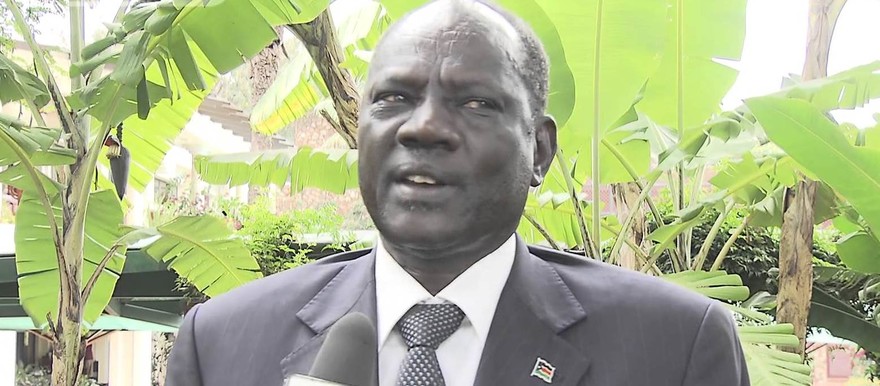The Minister of Information, Communication Technology, and Postal Services, Michael Makuei Lueth, on Friday told journalists after a council of ministers meeting that South Sudan’s neighbors closed their borders which has resulted in commodity scarcity.
“What has happened is that our neighbors here have decided to block, lock, or close their boundaries for cars that are coming in with goods, fuel or any other goods. This is the one responsible for the current scarcity of fuel and other items in the market. Minister Makuei said. “We are talking with our neighbors so that they open up their borders. This is the disadvantage of a country which is landlocked and as such we are talking with these people.”
Asked about the rampant road ambushes, especially on the Juba-Nimule road, Minister Makuei said, “Of course, these are people who do not even know the history of Uganda. When the Lord’s Resistance Army (LRA) was using padlocks to lock peoples’ mouths, what were they doing? Were they accusing the government of Uganda of having failed to protect its citizens? These (ambushes) are actions of rebels and they are uncontrollable.”
He said the only way to mitigate the ambushes is to protect the road and castigated rebels for orchestrating the attacks.
“There is no way we would say that whatever offense committed by any criminal or an outlaw, the government must be answerable. That is not true because when the LRA was here, it is us who chased them away,” Makuei said. “They know what the LRA was doing with Ugandan citizens. Was the government held responsible? Now that the rebels are with us today, whatever atrocities they commit, should the government be held responsible?”
He lambasted the international community for continuously lambasting the government of South Sudan.
“There is a big problem with the international community. Even in America, people go out shooting children in the schools, is the government of America held responsible for the death of those children? No.” Makuei said.
“But it is those criminals who are tracked down and brought to book if they are found. So with us here in South Sudan, it is rather strange because whatever crime committed by an individual is counted against the government.”
Makuei said Ugandan lawyers who spoke about the ambushing and killing of their people in South Sudan could be South Sudanese in the opposition and did not know what they were talking about.
“Those lawyers, I am sure they don’t know what they are talking about. These are the lawyers who could be South Sudanese in disguise, they could be South Sudanese who are in opposition and writing in the name of lawyers in Uganda,” he said.
Corrected that it was a Ugandan lawmaker (parliamentarian) who spoke about the attacks on Ugandans in South Sudan, Makuei said, “He could be a (South) Sudanese Acholi because those who are along the border, we do not know who they are. He could be a South Sudanese today and tomorrow a Ugandan.”
He said he knew that there were some South Sudanese in the Ugandan government.
“We have already controlled the roads and the Ugandans and the people who have decided not to come, we will assure them that the road is protected and they will be moving,” Minister Makuei said. “If they continue to refuse, then we will decide what to do. And these are the problems of not diversifying the routes of entry and exit. If we had other routes, nobody would close it but because we have only one route, this is why we are being put under that pressure.”
On high commodity prices, Makuei attributed them to the free market economy South Sudan has embraced.
“The issue of prices is one of our major problems. We decided to be a free market economy and in a free market economy, you do not control the market. If you want to control it, you raise the supply, once the supply is high the prices will automatically drop,” he said. “This is the policy of the market. Since we have adopted the policy of a free-market economy, there is no way we can control the market but we will control the exchange rate and the value. Now it has been controlled and it is dropping gradually. Prices are not like before.”
He concluded: “So, that is the situation. Let us hope for the best and we are optimistic that this road will open soon and people will come because it is also a livelihood for others and not only South Sudanese.”




